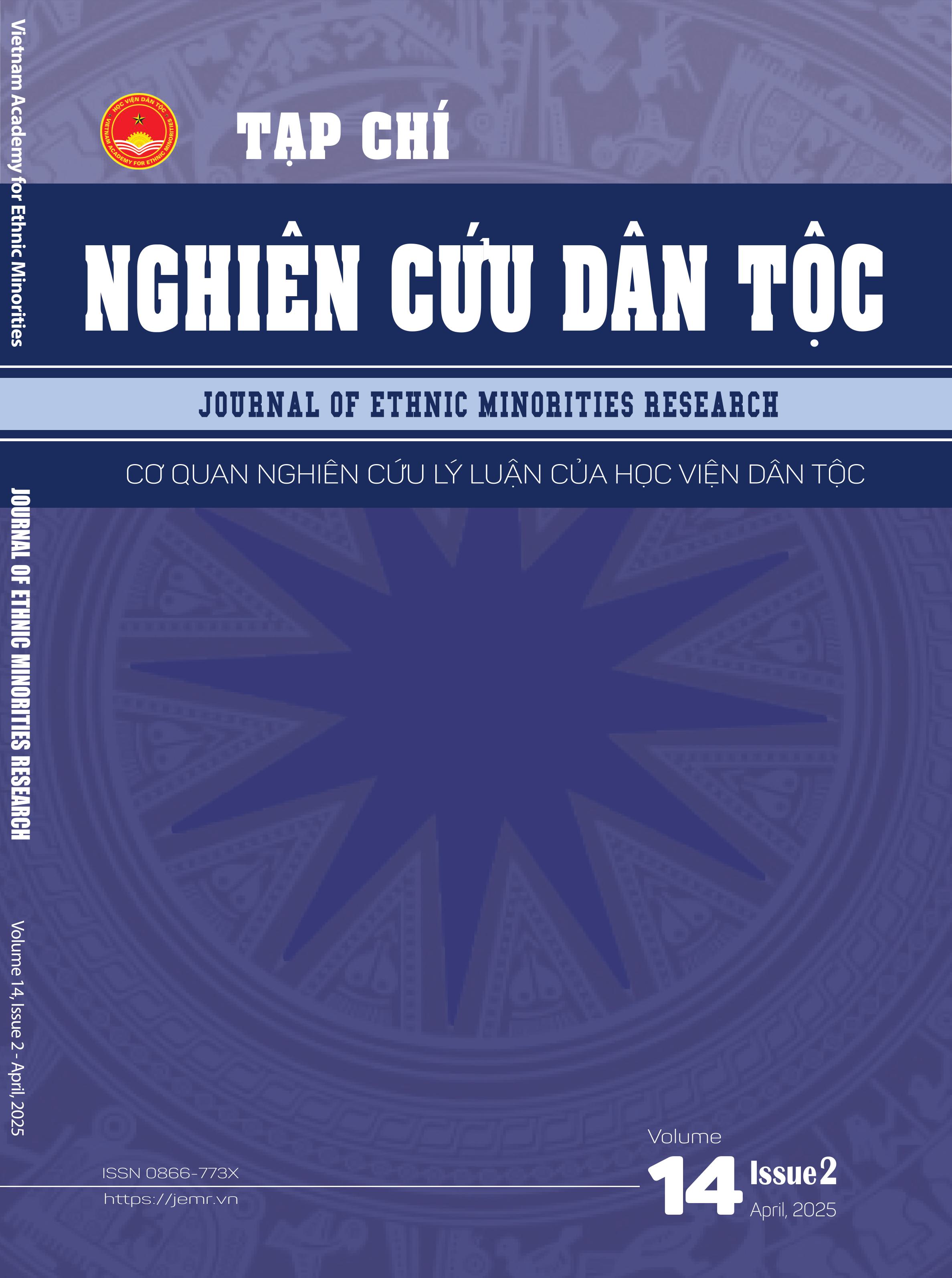MOTIVATIONAL FACTORS INFLUENCING KHMER VIETNAMESE EFL TEACHERS’ CAREER CHOICE
DOI:
https://doi.org/10.54163/ncdt/432Abstract
Drawing on Self-Determination theory, the current study examined how intrinsic, altruistic and extrinsic factors affected their career choice within the sociocultural context of the Khmer ethnic community. Extrinsic motivations such as job stability and social respect were found to be secondary motivational factors. These findings provide an insightful understanding of what motivated teachers in ethnically diverse contexts to choose teaching career and highlight the importance of integrating cultural and social considerations into teacher recruitment and retention strategies.
References
Bastick, T. (2000). Why teacher trainees choose the teaching profession: Comparing trainees in metropolitan and developing countries. International Review of Education, 6 (3), p.343-349.
Bergmark, U., Lundström, S., Manderstedt, L., & Palo, A. (2018). Why become a teacher? Student teachers’ perceptions of the teaching profession and motives for career choice. European Journal of Teacher Education, 41 (3), p.266-281.
https://doi.org/10.1080/02619768.2018.1448784.
Chirkov, V., Ryan, R. M., Kim, Y., & Kaplan, U. (2003). Differentiating autonomy from individualism and independence: A self-determination theory perspective on internalization of cultural orientations and well-being. Journal of Personality and Social Psychology, 84 (1), p.97-110.
Cornali, F. (2018). I’m going to be a teacher! exploring motives for teaching of a sample of Italian pre-primary and primary teacher candidates. Education 3-13, 47 (5), p.570-588.
https://doi.org/10.1080/03004279.2018.1510426.
Do, T. T. T., Sellars, M., & Le, T. T. (2022). Primary English language education policy in Vietnam’s disadvantaged areas: Implementation barriers. Educ. Sci. 12, 445.
https://doi.org/ 10.3390/educsci12070445.
Dörnyei, Z., & Ushioda, E. (2001). Teaching and researching motivation. New York, NY: Longman.
Fray, L., & Gore, J. (2018). Why people choose teaching: A scoping review of empirical studies, 2007–2016. Teaching and Teacher Education, 75, p.153-163.
General Statistical Office (2019). Completed results of the 2019 Vietnam population and housing census. Statisical Publishing House, 2020, assessed on February, 18th 2025.
Glutsch, N., & König, J. (2019). Pre-service teachers’ motivations for choosing teaching as a career: does subject interest matter? Journal of Education for Teaching, 45 (5), p.494-510.
https://doi.org/10.1080/02607476.2019.1674560.
Heinz, M. (2015). Why choose teaching? An international review of empirical studies exploring student teachers’ career motivations and levels of commitment to teaching. Educational Research and Evaluation, 21 (3), p.258-297.
https://doi.org/10.1080/13803611.2015.1018278.
Htang, L. K. (2019). Motivations for choosing teaching as a career: teacher trainees’ perspective from a Myanmar context. Journal of Education for Teaching, 45 (5), p.511-524.
https://doi.org/10.1080/02607476.2019.1674561.
Hai, N. C., Thanh, N. H., & Chau, T. M. (2021). Preservation of cultural values and socio-economic development in the sustainable development of the Khmer people in the Mekong Delta, Vietnam, 1–53.
https://doi.org/10.9734/bpi/mono/978-93-91595-78-4.
Han, J., & Yin, H. (2016). Teacher motivation: Definition, research development and implications for teachers. Cogent Education, 3 (1).
https://doi.org/10.1080/2331186X.2016.1217819.
Le, L. C., Le, X. N., Vo, V. L., Nguyen, H. A., & Cao, X. T. T. (2021). Improve the professional ability of Khmer ethnic minority secondary school teachers in southwestern Vietnam to meet the educational reform requirements. International Journal of Educational Sciences, 33 (1-3), p.59-63.
Li, Z., & Guo, W. Y. (2024). Pre-service teachers’ altruistic motivation for choosing teaching as a career: where does it come from? Frontiers in Psychology, 15, 1334470.
https://doi.org/10.3389/fpsyg.2024.1334470.
Mukminin, A., Rohayati, T., Putra, H. A., Habibi, A., & Aina, M. (2017). The long walk to quality teacher education in Indonesia: EFL student teachers’ motives to become a teacher and policy implications. Elementary Education Online, 16 (1), p.35-59.
Nesje, K., Brandmo, C., & Berger, J. L. (2017). Motivation to become a teacher: a Norwegian validation of the factors influencing teaching choice Scale. Scandinavian Journal of Educational Research, 62 (6), p.813-831.
https://doi.org/10.1080/00313831.2017.1306804.
Richardson, P. W., & Watt, H. M. (2006). Who chooses teaching and why? Profiling characteristics and motivations across three Australian universities. Asia‐Pacific Journal of Teacher Education, 34 (1), p.27-56.
Richardson, P.W., & Watt, H.M.G. (2018). Teacher professional identity and career motivation: A lifespan perspective. In: Schutz, P., Hong, J., Cross Francis, D. (eds) Research on Teacher Identity. Springer, Cham.
https://doi.org/10.1007/978-3-319-93836-3_4.
Perryman, J., & Calvert, G. (2020). What motivates people to teach, and why do they leave? Accountability, performativity and teacher retention. British Journal of Educational Studies, 68 (1), p.3-23.
https://doi.org/10.1080/00071005.2019.1589417.
Shi, Y. (2016). Mind is reality: Buddhism is not a pessimistic religion. Open Journal of Social Sciences, 4, p.28-38.
doi: 10.4236/jss.2016.410003.
Sinclair, C. (2008). Initial and changing student teacher motivation and commitment to teaching. Asia-Pacific Journal of Teacher Education, 36 (2), 79–104.
Štemberger, T. (2020). The teacher career cycle and initial motivation: the case of Slovenian secondary school teachers. Teacher Development, 24 (5), p.709-726.
https://doi.org/10.1080/13664530.2020.1829023.
Tang, S. Y., Wong, P. M., Wong, A. K., & Cheng, M. M. (2018). What attracts young people to become teachers? A comparative study of pre-service student teachers’ motivation to become teachers in Hong Kong and Macau. Asia Pacific Education Review, 19, p.433-444.
https://doi.org/10.1007/s12564-018-9541-x.
The Politburo, 2024. Conclusion No. 91-KL/TW of the Politburo on the implementation of fundamental and comprehensive renewal in education and training, assessed on February, 18th 2025.
Van, V. H., & Long, N. T. (2019). Identify the values of ancestor worship belief in the spiritual life of Vietnamese people. International Journal of Philosophy, 7 (4), p.160-166.
https://doi.org/10.11648/j.ijp.20190704.14.
Watt, H. M., Richardson, P. W., Klusmann, U., Kunter, M., Beyer, B., Trautwein, U., & Baumert, J. (2012). Motivations for choosing teaching as a career: An international comparison using the FIT-Choice scale. Teaching and teacher education, 28 (6), p.791-805.
Williams, M., & Burden, R. L. (1997). Psychology for language teachers: A social constructivist approach. Cambridge: Cambridge University Press.


